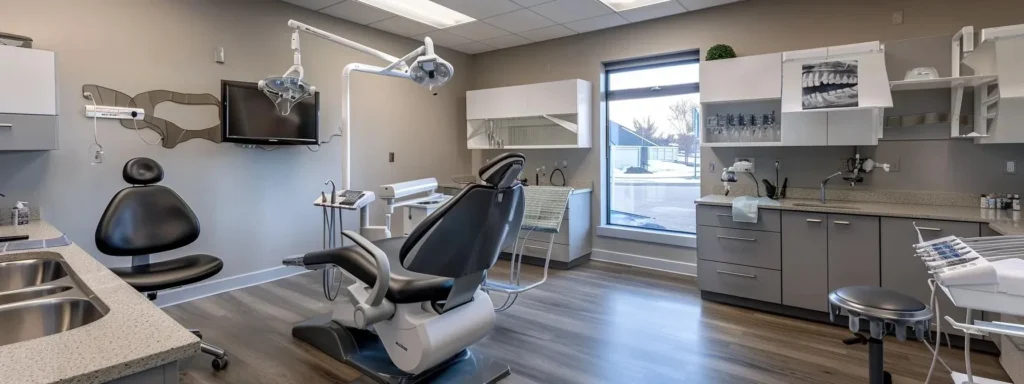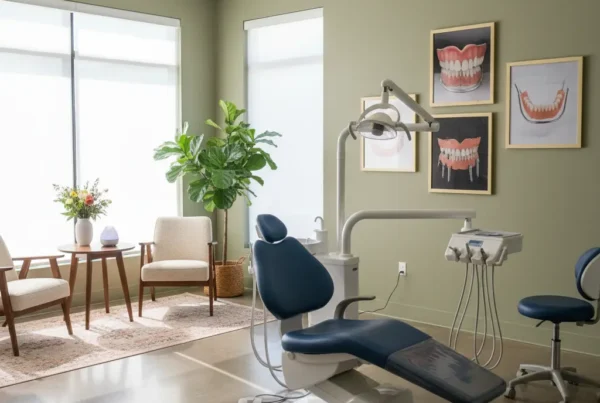Taking care of your partial dentures is like being a good caretaker for something precious, you handle the daily maintenance yourself but call in the experts when bigger problems arise! Knowing the difference between what you can safely do at home and what needs professional attention helps keep your dentures comfortable and lasting for years. With the right balance of home care and professional support, your partial dentures will serve you well.
Finding the Perfect Balance
Successfully maintaining partial dentures requires understanding the important balance between what you can handle at home and when you need professional dental care. Dr. Christopher J. Cappetta, with over 35 years of experience serving families in San Antonio, Texas, has helped countless patients learn this balance. His expertise with the American Dental Association and Academy of General Dentistry ensures patients receive clear guidance about safe home care and when professional intervention is necessary.
Self-care for partial dentures includes daily cleaning routines, proper storage, and minor comfort adjustments that don’t alter the structure of your dentures. These activities help maintain hygiene, prevent problems, and keep your dentures functioning well between professional visits. Think of this as the routine maintenance you do for your car, like checking the oil and keeping it clean.
However, some issues require the precision and expertise that only a dental professional can provide. Attempting complex adjustments at home can damage your dentures permanently or harm your oral health. Understanding these limitations protects both your investment in dentures and your overall well-being.
The partnership between your daily care and professional oversight creates the ideal environment for long-term denture success. Dr. Cappetta’s patients learn to recognize what they can manage independently and when to seek professional help, leading to better outcomes and fewer emergency situations.
Understanding the Critical Importance of Proper Fit
A well-fitting partial denture should feel comfortable and secure throughout the day without causing pain, sore spots, or excessive movement. When your dentures fit properly, you can eat, speak, and smile confidently without thinking about them. Poor fit, on the other hand, can lead to serious problems that affect both your oral health and quality of life.
The consequences of poorly fitting dentures extend far beyond simple discomfort. Constant rubbing against your gums can cause painful sores that make eating difficult and may become infected. Loose dentures can also damage your remaining natural teeth by putting stress on them in ways they weren’t designed to handle.
Signs of poor denture fit include:
- Persistent pain or discomfort while wearing dentures
- Sore spots that don’t heal or keep returning
- Dentures that slip or move when eating or talking
- Clicking sounds when you speak or chew
- Difficulty eating foods you used to enjoy
- Changes in your speech patterns
- Visible gaps between dentures and your gums
Some minor adjustments can be handled safely at home with the right tools and knowledge. For example, gently smoothing a small rough spot with a denture file designed for home use can provide relief from minor irritation. However, these adjustments should be extremely conservative and only address surface issues, never structural changes.
Major adjustments like resizing denture plates, changing the bite relationship, or altering the shape of clasps require professional expertise and specialized equipment. Attempting these modifications at home almost always results in damage that’s expensive to repair and may require complete denture replacement.
Recognizing Clear Warning Signs
Learning to identify situations that require immediate professional attention can prevent minor issues from becoming major problems. Your mouth and dentures will give you clear signals when something needs professional evaluation, and responding quickly to these warnings protects your oral health.
Any persistent discomfort that lasts more than a few days deserves professional attention. While some initial adjustment period is normal with new dentures, ongoing pain or irritation usually indicates a problem that won’t resolve on its own. Early intervention can often solve these issues with simple adjustments.
Changes in how your dentures fit or feel can happen gradually as your mouth naturally changes over time. Your jawbone and gums continue to change shape throughout your life, which can affect denture fit. When you notice these changes, professional evaluation helps determine if simple adjustments can restore comfort or if more significant modifications are needed.
| Warning Sign | Severity Level | Action Needed | Timeline |
| Minor rough spot | Low | Gentle home smoothing | 1-2 days |
| Persistent soreness | Medium | Professional evaluation | Within a week |
| Visible damage | High | Immediate professional repair | Same day |
| Loose fit | Medium | Professional adjustment | Within 2 weeks |
| Speech changes | Medium | Professional assessment | Within a week |
| Eating difficulties | High | Urgent professional care | Within a few days |
Visible damage like cracks, chips, or broken clasps always requires professional repair. These problems won’t improve on their own and often worsen quickly if not addressed. Home repair attempts usually cause additional damage that makes professional repair more difficult and expensive.
Establishing Your Home Care Routine
Proper daily care forms the foundation of successful partial denture maintenance and can prevent many problems that might otherwise require professional intervention. Your home care routine should focus on cleanliness, proper handling, and storage practices that protect your dentures and your oral health.
Daily cleaning removes bacteria, food particles, and plaque that can cause odors, staining, and oral health problems. Use a soft-bristled denture brush and cleaners specifically designed for partial dentures to avoid damaging the materials or components. Regular toothpaste is too abrasive and can scratch denture surfaces, creating areas where bacteria can accumulate.
Essential daily care steps include:
- Rinsing dentures after meals to remove loose debris
- Thorough brushing with denture cleaner before bed
- Overnight soaking in denture cleaning solution
- Gentle cleaning of remaining natural teeth and gums
- Inspection for any changes or damage
- Proper storage when dentures are removed
Regular dental check-ups allow for professional cleaning and evaluation that goes beyond what you can accomplish at home. During these visits, Dr. Cappetta can remove stubborn deposits, check for wear patterns, and make minor adjustments that maintain optimal fit and comfort. These preventive visits often prevent the need for more extensive repairs later.
Proper storage when your dentures aren’t being worn helps maintain their shape and prevents accidental damage. Dentures should be kept moist in water or denture soaking solution to prevent warping. A secure container protects them from being dropped or damaged, which is one of the most common causes of denture breakage.

Safe Home Adjustments and Their Limits
Understanding what adjustments you can safely make at home helps you address minor comfort issues without risking damage to your dentures. These adjustments should always be conservative, gradual, and limited to surface modifications that don’t alter the fundamental structure or fit of your dentures.
Minor rough spots or sharp edges can sometimes be gently smoothed with denture files or emery boards designed specifically for dental use. The key is working slowly and checking frequently to avoid removing too much material. These tools should only be used on small areas and never on metal components or major structural elements.
The limitations of home adjustments are more important than the adjustments themselves. Never attempt to bend clasps, change the shape of your dentures, or make modifications to improve fit. These changes require precise measurements and professional expertise to avoid creating bigger problems than you started with.
When in doubt, it’s always safer to contact your dental professional rather than attempt an adjustment yourself. Dr. Cappetta’s team can often provide guidance over the phone about whether a situation requires immediate attention or can wait until your next scheduled appointment. This professional input helps you make informed decisions about your denture care.
Emergency dental care is available for situations that can’t wait for a regular appointment. Fountain of Youth Dental provides same-day emergency services for urgent denture problems, ensuring that painful or problematic situations receive prompt professional attention.
Your Long-Term Success Strategy
Successful partial denture maintenance is an ongoing process that evolves as your dentures age and your mouth changes. Dr. Christopher J. Cappetta’s 35 years of experience helps patients develop sustainable approaches to denture care that adapt to changing needs while maintaining optimal function and comfort.
The investment in professional denture care pays dividends in extended denture life, better comfort, and fewer emergency situations. Patients who follow recommended care routines and seek timely professional attention typically enjoy many years of trouble-free denture use with minimal repairs or adjustments needed.
Understanding that your relationship with your partial dentures is a long-term commitment helps set realistic expectations about care requirements. Like any valuable tool or appliance, dentures require ongoing attention and occasional professional maintenance to perform their best. This perspective helps you view care routines as investments rather than chores.
The support system at Fountain of Youth Dental extends beyond just fixing problems to include education, prevention, and ongoing guidance that helps you succeed with your partial dentures. Dr. Cappetta’s commitment to patient education and his memberships in prestigious dental organizations ensure you receive care that meets the highest professional standards while remaining accessible and practical.
See More Reviews From Fountain of Youth Dental. View information about local places in our community.
Schedule Your Free Consultation Today!
Fountain of Youth Dental
5282 Medical Dr. #520 San Antonio, TX 78229 (210) 614-5481 Driving Directions
Frequently Asked Questions
Can I adjust my partial dentures at home?
You can safely make very minor adjustments like gently smoothing small rough spots with proper denture files, but significant changes should always be handled by a dental professional. Home adjustments should be extremely conservative and limited to surface modifications only. For any structural changes, bite adjustments, or clasp modifications, professional care is essential to avoid damaging your dentures or harming your oral health.
What are the signs I need professional denture adjustment?
Contact your dentist if you experience persistent discomfort lasting more than a few days, notice visible damage like cracks or chips, or feel that your dentures don’t fit the way they used to. Other warning signs include difficulty eating, changes in speech, clicking sounds, or sore spots that don’t heal. Early professional attention can often resolve these issues with simple adjustments.
How can I extend the life of my partial dentures?
Clean your dentures daily with proper denture products, attend regular dental check-ups, and store them correctly when not wearing them. Handle them carefully to avoid drops or damage, and seek professional attention promptly for any problems rather than attempting complex repairs yourself. Good daily care combined with regular professional maintenance typically extends denture life significantly while maintaining comfort and function.





